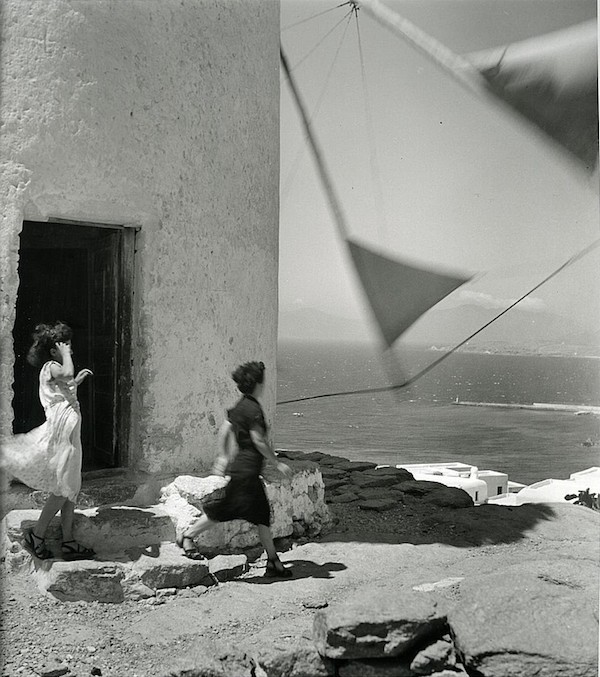
Ernst Haas Greece � 1952

I’ve featured my friend Wayne Hall here in Greece before, and I really like this of his:

Wayne Hall:
Ever since suffering a heart attack and being fitted with a stent a few years back, I have on medical advice gone walking. Every day, in fact. I have chosen to do it at the crack of dawn, following a circuitous route along the lanes and through the fields that separate our house two to three kilometres from the port and main town of the island of Aegina.
In the early stages of the circuit I pass by a house which is fortunately sturdily fenced. Within the enclosure there are two big dogs, both male, it seems. One of them, a ferocious black monster, is of terrifying appearance and for a very long period could be relied upon to go berserk with rage, jaws slavering, as one passed on the other side of the fence. The other also attacked regularly, not me, who was in any case inaccessible, but his barbarous companion. Quite amusing for the malicious spectator.
Of course even for a dog the toleration of monotony has its limits. Every day at the same time the human walks by on the other side of the fence. Can one keep up the same show forever? As the weeks pass the reactions become weaker and more sporadic. Finally there is little or no response. But the second dog is more persistent. His attention remains riveted on his companion, and if the black monster gives any sign of resuming old habits, the "good dog" is poised to pounce on him.
How nice it would be if this could be a true reflection of our macrocosm. Given a long period of demonstration that I have no intention of poaching on his precious preserve, the black monster settles into an unstable inertia under the vigilant eye of a supervisor who is probably his brother. If the United Nations were something different from what it is, this other peace-loving dog would be given an award.
There is a great deal of noise at the moment about the threat of nuclear war. Those who can remember, and I am one of them, think back to the Cuban missile crisis of 1962. But I also think back to a less distant time and to a song of Bob Dylan: :
“Fools glorifying themselves, trying to manipulate Satan
Big-time negotiators, false healers and woman haters
Masters of the bluff and masters of the proposition
But the enemy I see wears a cloak of decency
All non-believers and men stealers talkin’;
in the name of religion
And there’s a slow, slow train comin’;
up around the bend”
President John Kennedy was a master of the bluff and a master of the proposition. In the Cuban missile crisis he scared the pants off Nikita Krushchev by threatening to wipe the USSR off the map if the Soviets didn’t remove their missiles (or "missiles", as some say) from Cuba. This wasn’t what the US hawks wanted Kennedy to do. They wanted him to invade Cuba. Of course the US president also gained some plaudits from Americans who admired his hawkishness with Khrushchev. But they were a minority, probably for the most part amateur hawks, not "realistic" professionals. They could not have included Americans who, like Khrushchev apparently, but not like Stalin, believed what they had been taught about "nuclear deterrence". It must have been on the strength of this belief that Khrushchev was so happy about exploding one hundred megaton nuclear bombs in the Arctic as a "bluff" to scare the world and in particular "deter" the Americans, who exploded big bombs too, in the Pacific, but not as big.
This bluff element is totally absent from the analyses one can read about the Cuban missile crisis. Kennedy and Khruschchev are simply lauded for their statesmanship in deciding not to start a nuclear war. If Kennedy had remained alive this would have been divisive because in a subsequent move he went from bluff to proposition, from which there emerged the limited nuclear test ban treaty. There could have been argument over whether this signified a victory for the hawks or a victory for the doves. Instead there was consensus over how terrible it was that John Kennedy had been murdered. After he had been murdered. Khrushchev’s fate was less drastic. He was simply sacked for being the one whose bluff was called. The fact that he had gained some concessions (some withdrawal of US nuclear weapons from Turkey) was advertised by the Western Left but ignored by the decision makers in Moscow. The doctrine of nuclear deterrence survived unscathed.


Support the Automatic Earth in virustime with Paypal, Bitcoin and Patreon.









